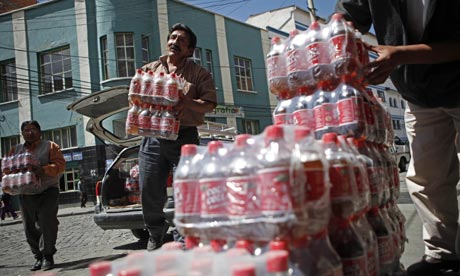
(above) Coca Colla being distributed in La Paz this week. The drink is named after the Bolivian Colla people. Photograph: Dado Galdieri/AP
Coca Colla: the new 'real thing' in Bolivia
April 14, 2010 - Guardian.co.uk
• Bolivian president approves Coca-based dark soft drink
• Coca-Cola company yet to comment on red-labelled beverage
A certain US soft drinks giant may disagree, but Bolivia has come up with a fizzy beverage it says is the real thing: Coca Colla.
The drink, made from the coca leaf and named after the indigenous Colla people from Bolivia's highlands, went on sale this week across the South American country.
It is black, sweet and comes in a bottle with a red label – but similarities to Coca-Cola end there. One is a symbol of US-led globalisation and corporate might; the other could be considered a socialist-tinged affront to western imperialism.
The first batch of 12,000 bottles, priced about $1.50 (96p) for half a litre, were distributed in the capital, La Paz, as well as Santa Cruz and Cochabamba.
The familiar-sounding name and packaging may rile the Atlanta-based soft drinks manufacturer, but Coca Colla could also cause groans in Washington.
It is made from the coca leaf, a mild stimulant that wards off fatigue and hunger, and has been used in the Andes for thousands of years in cooking, medicine and religious rites.
Coca is also the raw ingredient of cocaine, the powerful narcotic that is the primary target of the US-led "war on drugs".
Bolivia tried to wipe out the leaf at Washington's behest. But that was before Evo Morales, an Aymara Indian and coca grower, was elected president, championing coca as a crop with legitimate uses.
The socialist government vowed zero tolerance for cocaine but expelled drug enforcement administration agents, accusing them of spying, and encouraged Bolivian companies to use coca to make teas, syrups, toothpaste, liqueurs, sweets and cakes.
It backed Coca Colla from the beginning. "We are seeing how we can give it impetus, because the industrialisation of coca interests us," the deputy minister of rural development, Victor Hugo Vázquez, told the news agency Efe earlier this year.
If the coca spin-offs work out, the government said the area of land authorised for legal cultivation of the leaf may expand from 12,000 hectares to as much as 20,000 hectares.
The US warned that most of the coca crop would be siphoned off for cocaine, and accused Bolivia of failing to co-operate in the fight against drugs.
Coca-Cola, which denies ever having used cocaine in its recipe, did not immediately respond to requests for its views on the Andean upstart.
It is not the first time the corporation has faced a South American coca rival. In 2005, Paez Indians in south-western Colombia launched Coca Sek, which was also based on coca extracts, and sought to promote the cultivation and everyday consumption of the coca leaf, including in tea. But the drink was banned the following year amid pressure from the international narcotics control board, the body responsible for implementing United Nations drugs conventions.